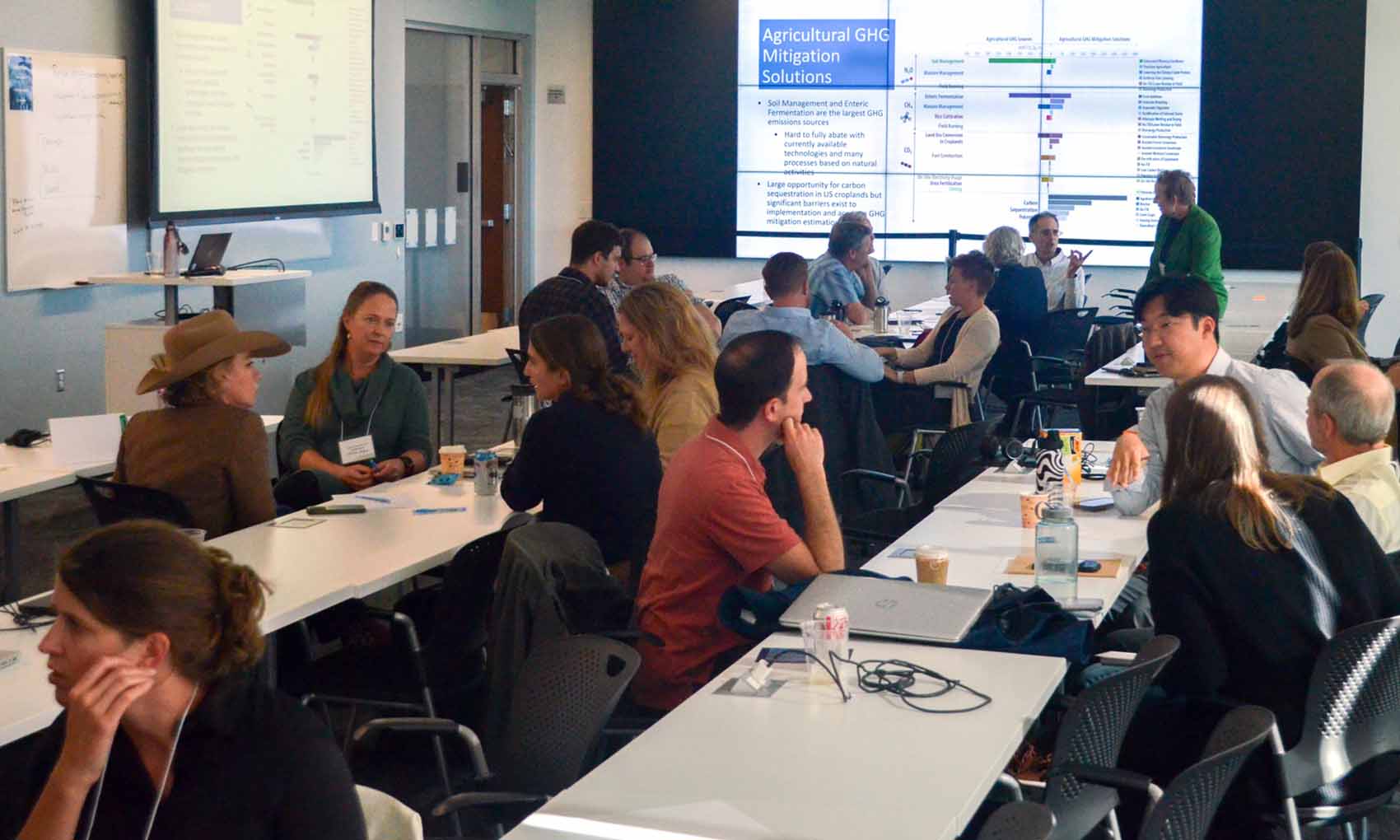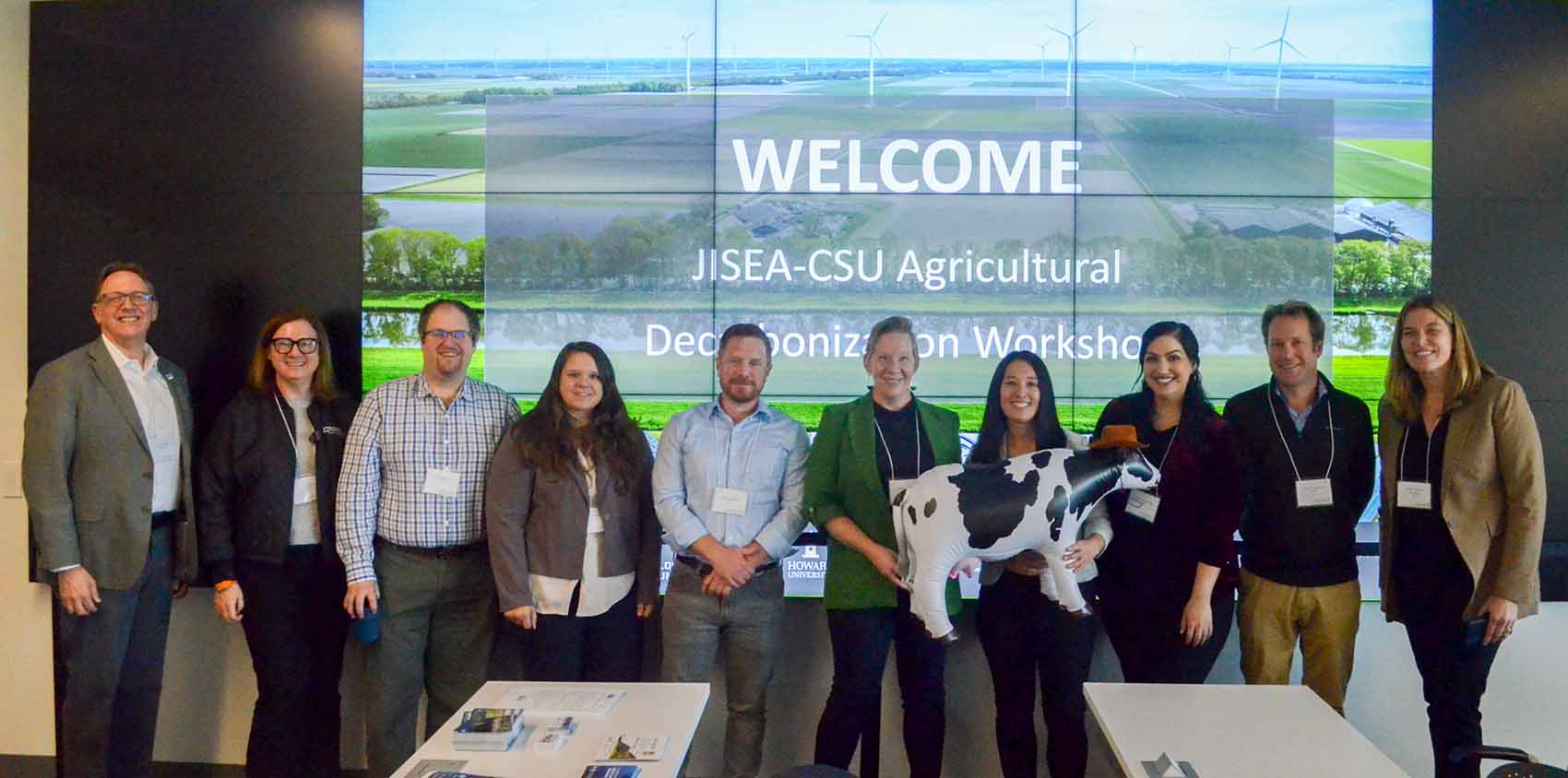JISEA and Colorado State University Plant Seeds of Sustainable Agriculture Through New Collaboration
Workshop Brings Diverse Set of Stakeholders Together To Grow Resiliency and Sustainability

Agricultural philosopher Masanobu Fukuoka once said, “The ultimate goal of farming is not the growing of crops, but the cultivation and perfection of human beings.”
In the same vein, the Joint Institute for Strategic Energy Analysis (JISEA) is using its Sustainable Agriculture Catalyzer to cultivate new connections in the agriculture sector and advance agricultural sustainability. The catalyzer is now bringing a variety of stakeholders together to ensure it is on the path toward a fruitful outcome for everyone.
To that end, JISEA partnered with Colorado State University’s Ag Innovation Center (CSU Spur) to put on a sustainable agriculture workshop on Oct. 21. The one-day event, sponsored by the Colorado-Wyoming Climate Resilience Engine, included discussions surrounding new agricultural methods, energy opportunities, and technology adoption, featuring speakers from CSU, the U.S. Department of Agriculture (USDA), and the National Renewable Energy Laboratory (NREL), as well as farmers, technology innovators, and others in the agriculture industry.
“Agriculture is so diverse,” said Brittany Staie, Sustainable Agriculture Catalyzer lead and food, energy, and water nexus researcher at NREL. “Getting folks who are working on impacts to ecosystem services and the environment together with actual farmers whose daily lives and bottom lines are impacted by implementing new solutions is one of the main goals of this work.”
Over the next few years, the Sustainable Agriculture Catalyzer will work directly with researchers, industry, and farmers to determine the cobenefits and potential barriers to implementing various sustainable agricultural practices and systems. A major reason for this need is there are so many different components making up the agriculture sector.
“The agriculture sector is very complex,” Staie said. “Every farmer operates independently, so you can’t just have a generalized A to Z: ‘Here’s how to make your farm sustainable.’ It has to make sense on the individual level.”
Cultivating a Conversation

To facilitate the conversations surrounding everything from emissions mitigation to agrivoltaics implementation, JISEA leveraged its convening capabilities, hosting the Sustainable Agriculture workshop within its diverse portfolio. The institute’s partnership with CSU’s Ag Innovation Center enabled this latest workshop to come to fruition by bringing together a mix of researchers, governmental institutions, agriculture technology innovators, and producers.
“We're so pleased to partner with NREL on this tough challenge, because they think
so holistically about these systems,” said Jordan Lambert, director of Ag Innovation at CSU Spur.
Lambert presented on the impacts of different types of agricultural carbon emissions and new opportunities for improvements in crops, livestock, and renewable energy on farms. Other presentations highlighted the importance of soil health and resiliency, rural on-site energy considerations, and implementing technologies like agrivoltaics and methods like cover cropping.
A panel discussion after the morning’s presentations gave stakeholders across the board a chance to tackle questions surrounding potential barriers to adopting new technologies and methods, revealing several key insights.
Notably, there is a lack of data across agricultural sectors, leading to uncertainties about adopting new technologies. Many of the producers at the workshop said, in general, farmers prefer to see real-world demonstrations to know new methods work before using them themselves.
Along with that, farmers raised concerns about the cost and potential incentives for adopting new technologies. Several producers spoke up, saying new technologies often are not economically viable for them. They also felt that while incentives could help with adoption, they also could create a dependency on those incentives to continue using new technologies.
Sowing the Seeds of Sustainability
The workshop set up the potential for future workshops and expanded internal and external collaborations as the catalyzer continues.
JISEA and CSU are planning to hold one of those workshops on a farm to demonstratively showcase how some of the new agricultural technologies could be used. On top of the potential for an in-person workshop on a farm, the hope is to also hold more quarterly and virtual events to involve more producers across markets.
“Success looks like keeping the momentum going, getting all of those voices in the room at once, and especially engaging more agricultural producers,” JISEA Center Director Elizabeth Doris said.
View the workshop slides and the Sustainable Agriculture Catalyzer website to learn more.
Note: The Joint Institute for Strategic Energy Analysis retired in February 2025.
Last Updated May 28, 2025
